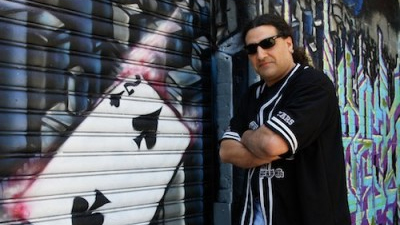All the latest guitar news, interviews, lessons, reviews, deals and more, direct to your inbox!
You are now subscribed
Your newsletter sign-up was successful

It's pretty near impossible to be at all engrossed in the New York City metal scene without running into Munsey Ricci on a regular basis.
A longtime industry figure, Ricci has headed up Skateboard Marketing, one of the most successful indie radio promotions companies around, for two decades now — no small feat given the ever-changing nature of the music business.
As someone who's been around through the good times and bad in the music industry, and still kept on trucking, we couldn't help but catch up with Munsey to pick his brain about the state of the business, both then and now.
First thing’s first: For the uninitiated, tell us a bit about what Skateboard Marketing does.
MUNSEY RICCI: Skateboard Marketing Ltd. is an independent radio promotion company. We are called Indies. We are the people that are hired by the record company, management company or artist. Our main focus is to get radio airplay for the band. Yes, record companies have their in-house people, but they need outside Indies to help the process. They use our relationships at radio to expand the airplay for their bands.
You got your start in the record industry, back in the days when people still bought CDs. Of course now, that whole industry is in shambles. Were there any warning signs back then that the business model there couldn’t last forever.
Well, yes and no. Change is inevitable. Every form of industry related methods will change. But we saw the evolution of vinyl to disc. Now it's shifting to digital. But one thing is for sure, you will never eliminate the need for a physical disc. There will always be fans who want to buy something physical.
All the latest guitar news, interviews, lessons, reviews, deals and more, direct to your inbox!
But the whole method of how music is delivered to fans is changing. The industry is just getting over the hump of the new system. Even the way we service radio is mainly digital now. Back in the day we would service over 500 discs to stations. Now we service less than 100. Stations download the audio files into their system; it's painless. Unless you're a die hard fan who wants a disc. But digital delivery to radio is really not the best way to do it. It's still physical that gets stronger results. But that will change as the digital delivery system grows. Fans always grow with it!
What was your motivation at the time for starting Skateboard Marketing? Were you trying to fill a void that the in-house press/radio people at labels just couldn’t fill?
I came from a major label. When I was in college, I was the MD/PD of our station WQCC. I also worked for CMJ and at Combat In-Effect Records for a year. Then I was offered the national gig at PolyGram Records. It was Director of National Metal Promotion. They were the last major label not to have a metal department.
There was a changing climate at the label with a new president. He started to bring in all his own people. So Johnny Barbis and Sky Daniles said, "Work Indie for a while and see how you like it." That's how Skateboard Marketing Ltd. was formed. I kind of set the company up around the Indie label perspective with the major label structure. It's a system that works. You combine the larger system, but base the radio and album set-up around that. It leaves you a lot of room to grow. This gives you the freedom to set up records with a cool underground vibe.
Plus, for the major label bands with the commercial active and mainstream crossover? You can do a little something different with them too. There is no science to how to set up a record. It's all just getting creative, then finding a system that works. Many major and Indie labels have their own in-house people. But almost all records need that extra push to get them over the hump.
People now have a ton of different options for discovering new music. How has the place of radio changed from where it was 10-15 years ago?
Oh yeah, it's so easy now. The digital side of things is totally genius. I so love it. I can find everything I need from a press, record company or artist private login page. But there are a lot of other outlets to make the job easier: iPool, Play MPE and the other radio digital delivery pages. Getting new releases from the label is easy. But for Independents, they all have a Facebook, Reverbnation or Sonicbids account. I can find new stuff and stream it.
But I'm still old school, I burn it to a disc and bring it with me in the car. I totally dig listening to new stuff while I'm driving.
Skateboard Marketing is currently celebrating its 20th anniversary. Without giving away too much, is there a secret to longevity in the music business?
Actually you have your dos and don'ts. The first thing is you have to know how to treat people. Plus it's all about results. You have to deliver on your word. It's something that a lot of new industry people learn the hard way. If you have a relationship, use it! But don't kill it over something stupid. Being cool with people goes a long way, but most of all is finding a system that works.
From there you just mold it to one that works for you and your staff. If you don't have a solid system and infrastructure in place. You're doomed for failure. You also need to change with the industry as it changes. You can keep your system in place, just work it around the new changing face of everything.
Give us a couple bands on your plate right now that have you excited.
Dude, the new Iced Earth and Warbringer are both awesome. Also the new Generation Kill — it's Rob [Dukes] from Exodus and Rob Machetti from Pro-Pain and MOD. I really like the new System Divide album also. It's way heavy with some great guitar work. I am waiting for the new Soilwork and Testament. Both for sure will kick ass!
For more on Skateboard Marketing, visit their official website.
Josh Hart is a former web producer and staff writer for Guitar World and Guitar Aficionado magazines (2010–2012). He has since pursued writing fiction under various pseudonyms while exploring the technical underpinnings of journalism, now serving as a senior software engineer for The Seattle Times.

